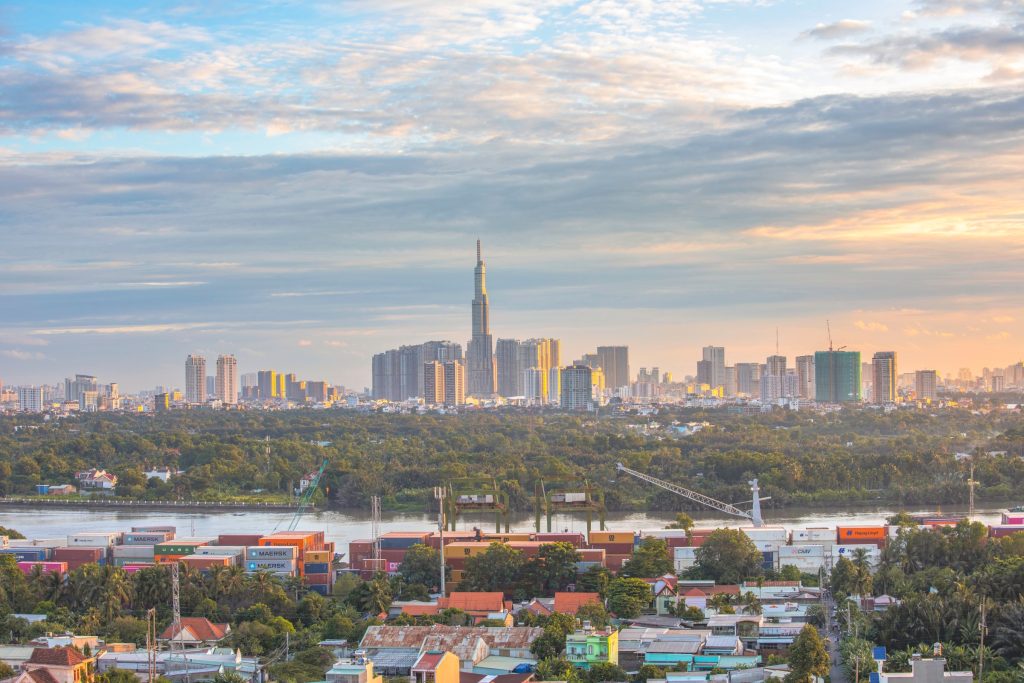OPTIMISTIC PROSPECTS FOR VIETNAM’S REAL ESTATE RECOVERY IN LATE 2024
Vietnam’s real estate market stands at the threshold of a substantial recovery, buoyed by positive economic indicators and strong FDI inflows. While challenges persist, the sector’s resilience and the forthcoming impact of new regulations suggest a promising future, fostering a landscape where growth and optimism flourish in tandem.
Vietnam’s real estate market is displaying encouraging indications of a substantial rebound in the latter half of 2024. Recent data from the State Bank of Vietnam (SBV) Ho Chi Minh City branch reveals a sustained positive trajectory in real estate credit growth over the past three months. Infrastructure development in export processing zones, industrial parks, and office space rentals have notably outperformed other sectors, indicating a renewed investor confidence in the sector’s potential.
In an economic landscape marked by cautious capital absorption, the resurgence in real estate offers a potential catalyst for broader recovery. According to SBV statistics, real estate credit saw a 0.96% increase in March 2024, a 1.15% rise in April, and a steady 1.15% uptick in May. By the end of May, outstanding real estate loans reached 992.8 trillion VND, comprising 28% of the total credit balance in the region and marking a 2.78% increase from the previous year’s end, outpacing general credit growth.
The housing credit segment, which includes loans for home purchases and self-use, remains dominant, constituting 67.78% of the total real estate credit. This segment’s resurgence, with a 1.2% growth in May 2024 following months of contraction, signals a renewed homeowner confidence likely spurred by improving economic conditions and favorable loan terms.
Complementing these domestic gains, Vietnam’s General Statistics Office reports a substantial surge in foreign direct investment (FDI) in the first half of 2024. By June 20, registered FDI surpassed $15 billion, a 13% increase year-over-year. New FDI projects rose nearly 19% in number and 47% in capital, with the real estate sector attracting nearly $1.9 billion—4.7 times higher than the same period last year and accounting for almost 20% of total new registered capital.
Singapore emerged as the largest investor, contributing over $4 billion and representing 42% of the total new registered capital. This was followed by Hong Kong with nearly $1.2 billion, China and Japan with around $1 billion each. This influx underscores a robust international confidence in Vietnam’s real estate market.
Further bolstering this optimism, 592 ongoing projects adjusted their investment capital, adding nearly $4 billion—a 35% increase from the previous year. The combined new and adjusted FDI in real estate activities approached $2 billion, a 3.4-fold increase from the previous year, constituting nearly 15% of total registered capital.
Implemented FDI in the first half of 2024 reached nearly $11 billion, marking an 8% increase year-over-year and the highest in five years. Real estate alone attracted $1 billion, doubling the amount from the same period last year and comprising over 9% of total implemented FDI.
Despite these positive trends, the market faces significant challenges. Global geopolitical tensions, economic instability, prolonged inflation, and the threat of a global debt crisis loom large. The market also grapples with supply-demand imbalances, with investors favoring bank deposits over real estate investments.
Legal and regulatory hurdles add to the complexity, particularly in project licensing. New laws on land, housing, and real estate business, set to take effect soon, alongside complex land use fee calculations, contribute to the challenges.
Funding remains another critical concern, with Vietnam addressing the pressure of maturing bonds from five years ago, totaling 300 trillion VND. An investor likened the situation to “fighting today’s battles with yesterday’s strategies,” highlighting the need for contemporary solutions to these legacy issues.
Nonetheless, market experts remain optimistic about recovery prospects. Vietnam’s projected GDP growth of 5.5%, increasing FDI and trade, low lending rates, and favorable new regulations form the bedrock of this optimism. The recovery is expected to be most pronounced in residential real estate, catering to genuine demand and affordable housing, particularly Class B and C apartments. A significant market breakthrough is anticipated around the second quarter of 2025 when new regulations and decrees take full effect.
Get professional insights in Vietnam properties, residential leasing and asset management by Arcadia Consulting Vietnam, reach our Residential Services team at rs@arcadia-consult.com.vn.

